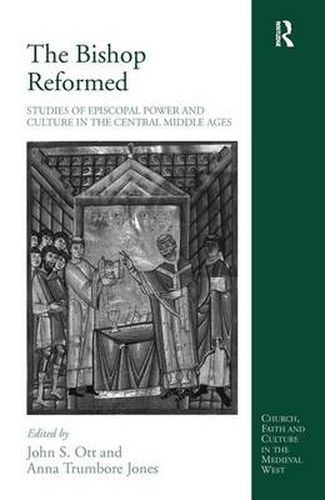The Bishop Reformed: Studies of Episcopal Power and Culture in the Central Middle Ages
Anna Trumbore Jones

The Bishop Reformed: Studies of Episcopal Power and Culture in the Central Middle Ages
Anna Trumbore Jones
In the period following the collapse of the Carolingian Empire up to the Fourth Lateran Council (1215), the episcopate everywhere in Europe experienced substantial and important change, brought about by a variety of factors: the pressures of ecclesiastical reform; the devolution and recovery of royal authority; the growth of papal involvement in regional matters and in diocesan administration; the emergence of the crowd onto the European stage around 1000 and the proliferation of autonomous municipal governments; the explosion of new devotional and religious energies; the expansion of Christendom’s borders; and the proliferation of new monastic orders and new forms of religious life, among other changes. This socio-political, religious, economic, and cultural ferment challenged bishops, often in unaccustomed ways. How did the medieval bishop, unquestionably one of the most powerful figures of the Middle Ages, respond to these and other historical changes? Somewhat surprisingly, this question has seldom been answered from the bishop’s perspective. This volume of interdisciplinary studies, drawn from literary scholarship, art history, canon law, and history, seeks to break scholarship of the medieval episcopacy free from the ideological stasis imposed by the study of church reform and episcopal lordship. The editors and contributors propose less a conventional socio-political reading of the episcopate and more of a cultural reading of bishops that is particularly concerned with issues such as episcopal (self-)representation, conceptualization of office and authority, cultural production (images, texts, material objects, space) and ecclesiology/ideology. They contend that ideas about episcopal office and conduct were conditioned by and contingent upon time, place and pastoral constituency. What made a good bishop in one time and place may not have sufficed for another time and place and imposing the absolute standards of prescriptive ideologies, medieval and modern, obfuscates rather than clarifies our understanding of the medieval bishop and his world.
This item is not currently in-stock. It can be ordered online and is expected to ship in approx 2 weeks
Our stock data is updated periodically, and availability may change throughout the day for in-demand items. Please call the relevant shop for the most current stock information. Prices are subject to change without notice.
Sign in or become a Readings Member to add this title to a wishlist.


